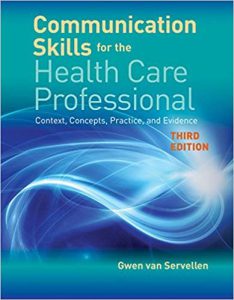(eBook PDF) Communication Skills for the Health Care Professional: Context, Concepts, Practice, and Evidence 3rd Edition
$50.00 Original price was: $50.00.$35.00Current price is: $35.00.
(eBook PDF) Communication Skills for the Health Care Professional: Context, Concepts, Practice, and Evidence 3rd Edition – Instant Download
(eBook PDF) Communication Skills for the Health Care Professional: Context, Concepts, Practice, and Evidence 3rd Edition – Digital Ebook – Instant Delivery Download

Product details:
- ISBN-10 : 128414142X
- ISBN-13 : 978-1284141429
- Author: Gwen van Servellen
Communication Skills for the Health Care Professional, Third Edition is a comprehensive guide to improving patient outcomes through relationship building and the use of information technology to foster communication between patients, families, and health providers. The author examines the context for communication in an evolving health care system and provides the foundations for understanding human and therapeutic communication. Readers will learn critical competencies to ensure quality, patient-centered care as well as skills to manage communication across relevant constituencies.
Table contents:
Part I The Context for Health Care Communications in an Evolving Health Care System
Chapter 1 Evolution of Health Care Delivery and Implications for Health Providers
Chapter 2 Technological Advances Have Changed the Way Health Professionals and Patients Communicate
Chapter 3 Problems in Access to and Availability of Health Care Intimately Linked to Patient-Provider Communications
Part II Foundations for Understanding Communications in Health Care
Chapter 4 Principles of Human Communication
Chapter 5 The Nature of Therapeutic Communications
Chapter 6 Cultural Similarities and Differences and Communication
Part III Critical Competencies in Therapeutic Communications
Chapter 7 The Pervasive Role of Empathy, Confirmation, and Compassion
Chapter 8 Communications That Contribute to Trust and Mistrust of Providers
Chapter 9 The Art and Skillful Use of Questions
Chapter 10 Therapeutic Use of Silence and Pauses
Chapter 11 The Impact of Self-Disclosures
Chapter 12 The Proper Placement of Advisement
Chapter 13 Reflections and Interpretations
Chapter 14 The Judicious Use of Confrontations, Orders, and Commands
Part IV Communications to Ensure Comprehensive and Continuous Patient-Centered Care under Challenging Circumstances
Chapter 15 Communicating with Patients with Low Health Literacy
Chapter 16 Communicating with Patients Who Have Chronic and/or Life Threatening Illness
Chapter 17 Communicating with Patients and Families in Crisis
Chapter 18 Communicating Effectively with Patients Displaying Significant Negative or Resistive Coping Responses
Part V Beyond Patient-Provider Encounters: Managing Communications Within and Across Relevant Constituencies
Chapter 19 Communications Within and Across Health Care Provider Groups
Chapter 20 Beyond Patient-Provider Encounters: Managing Communications Within and Across Relevant Constituencies
Chapter 21 Family Dynamics and Communications with Patients’ Significant Others
Part VI Ethics and Communications in Health Care
Chapter 22 Patient’s Rights to Informed Choice and Consent in Health Care Decision Making
Chapter 23 The Privileged Nature of Patient- Provider Communications: Issues of Confidentiality, Anonymity, and Privacy
Part VII Transforming Health Care through Changing Patient Behaviors and Systems of Care
Chapter 24 Transforming Health Care through Changing Patient Behaviors and Systems of Care
Chapter 25 Altering Systems of Care to Enhance Health Care Communications
Part VIII Evidence Supports the Importance of Effective Communications
Chapter 26 Bringing Health Provider Communication to the Patient, Not Patient to Provider
Chapter 27 Communications to Promote Behavior Change
Chapter 28 Collaborative Care to Promote Treatment Adherence and Effective Mental Health Care
Chapter 29 Communications for Advance Care Planning
People also search:
cpr for health care professional
health care professional
a health care professional who teaches people how to manage diabetes is known as a/an
some depression goes away on its own, but you should contact a health care professional if symptoms last for
what does your choice of career as a health care professional indicate?



